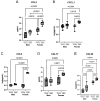Sex Differences in the Inflammatory Profile in the Brain of Young and Aged Mice
- PMID: 37408205
- PMCID: PMC10216304
- DOI: 10.3390/cells12101372
Sex Differences in the Inflammatory Profile in the Brain of Young and Aged Mice
Abstract
Neurodegenerative diseases are a leading cause of death worldwide with no cures identified. Thus, there is a critical need for preventative measures and treatments as the number of patients is expected to increase. Many neurodegenerative diseases have sex-biased prevalence, indicating a need to examine sex differences when investigating prevention and treatment strategies. Inflammation is a key contributor to many neurodegenerative diseases and is a promising target for prevention since inflammation increases with age, which is known as inflammaging. Here, we analyzed the protein expression levels of cytokines, chemokines, and inflammasome signaling proteins in the cortex of young and aged male and female mice. Our results show an increase in caspase-1, interleukin (IL)-1β, apoptosis-associated speck-like protein containing a caspase recruitment domain (ASC), and ASC specks in females compared to males. Additionally, there was an increase in IL-1α, VEGF-A, CCL3, CXCL1, CCL4, CCL17, and CCL22 in aging females and an increase in IL-8, IL-17a, IL-7, LT-α, and CCL22 in aging males. IL-12/IL-23p40, CCL13, and IL-10 were increased in females compared to males but not with age. These results indicate that there are sex differences in cortical inflammaging and provide potential targets to attenuate inflammation to prevent the development of neurodegenerative disease.
Keywords: ASC; IL-1β; brain; caspase-1; chemokines; cytokines; inflammaging; inflammasome; sex differences.
Conflict of interest statement
J.P.d.R.V. is a co-founder and managing member of InflamaCORE, LLC, and has licensed patents on inflammasome proteins as biomarkers of injury and disease as well as on targeting inflammasome proteins for therapeutic purposes.
Figures





References
-
- Kumar P., Liu C., Hsu J.W., Chacko S., Minard C., Jahoor F., Sekhar R.V. Glycine and N-acetylcysteine (GlyNAC) supplementation in older adults improves glutathione deficiency, oxidative stress, mitochondrial dysfunction, inflammation, insulin resistance, endothelial dysfunction, genotoxicity, muscle strength, and cognition: Results of a pilot clinical trial. Clin. Transl. Med. 2021;11:e372. doi: 10.1002/ctm2.372. - DOI - PMC - PubMed
Publication types
MeSH terms
Substances
LinkOut - more resources
Full Text Sources
Medical
Miscellaneous

